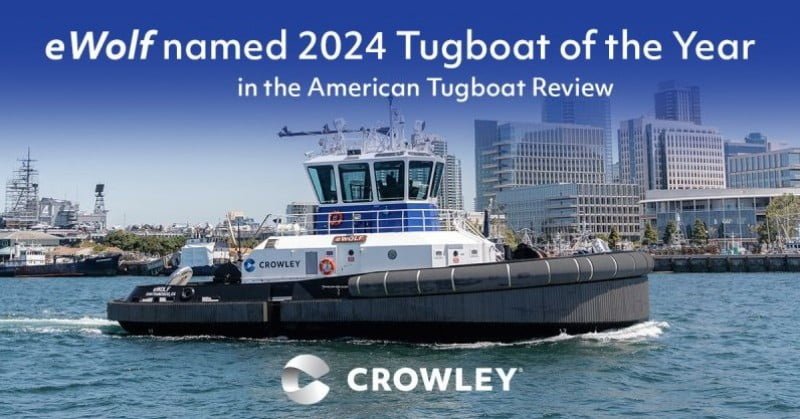Crowley made history today at the Port of San Diego by christening the eWolf, the nation’s first fully electric ship assist harbor tugboat. This groundbreaking vessel, heralded for its zero emissions and cutting-edge sustainable technology, embodies Crowley’s firm commitment to innovation, safety, and environmental stewardship in the maritime industry.
“The eWolf is a historic milestone in the maritime industry and Crowley’s legacy and underscores our company’s commitment to serve as global sustainability leaders and innovators. The all-electric tugboat is the most technologically advanced vessel of its kind, and eWolf will help our customers and communities reach their decarbonization goals while delivering capabilities that strengthen our vital supply chain,” said Tom Crowley, Chairman and CEO.
“We congratulate the people whose tireless dedication brought the eWolf to fruition with our partners at the federal, state, and local government, setting a new standard not just in America, but globally.”
During the ceremony, Crowley welcomed Gustav Hein, Director of the Mid-Pacific Gateway Region for the U.S. Maritime Administration; Frank Urtasun, Port of San Diego Chairman; Jack Shu, San Diego County Air Pollution Control District Governing Board Chair and a City of La Mesa Councilmember; Diane Takvorian, member of the California Air Resources Board; and Council President Pro Tem Joe LaCava of San Diego to celebrate the industry milestone. Crowley Vice Chairwoman Christine Crowley served as the sponsor to give the blessing and conduct the christening on San Diego Bay. The eTug will enter commercial service this week.
“Crowley’s first-of-its-kind electric tugboat is a game changer. It checks all the boxes by providing environmental, economic, and operational benefits for our communities and maritime industry,” said Urtasun. “This is truly a story of teamwork and collaboration. We are proud to work with Crowley and our state and local partners on this and other electrification initiatives at and around our port, including electric cargo handling equipment like our all-electric mobile harbor cranes, our microgrid, vessel shore power, and more.”
Built by Master Boat Builders in Coden, Ala., the 82-foot vessel delivers 70 tons of bollard pull, stronger than its conventional predecessor. The eTug also features a fully integrated electrical package for battery energy storage by ABB with advanced technology for mariner safety. eWolf is supported by a new microgrid shoreside charging station that enables the tug to operate at full performance daily on electricity.
Crowley was joined at the vessel christening by project partners including the Port of San Diego, San Diego County Air Pollution Control District, the California Air Resources Board (CARB), the U.S. EPA, and the U.S. Maritime Administration. The collaborative effort among federal, state, and local partners to decarbonize the port furthers the shared goal of improving air quality for San Diego.
“CARB is proud to partner on this historic effort that will reduce air and climate pollution. Impacted portside communities, like Barrio Logan and National City, breathe more diesel pollution than 90% of California communities and children experience up to 5 times more asthma hospitalizations,” said Takvorian, CARB board member. “The eWolf will contribute significantly to creating a healthy environment for all communities.”
“SDAPCD is proud to have provided funding for the eWolf project, a groundbreaking initiative aimed at transitioning from traditional diesel-powered vessels to electric propulsion systems,” said Shu, City of La Mesa Councilmember and SDAPCD Governing Board Chair. “The eWolf exemplifies how collaboration between government and private partners can drive meaningful change, contributing significantly to a cleaner, healthier environment for everyone.”
Crowley Fully Electric Harbor Tugboat eWolf

A longtime leader in safe and efficient marine services, the company chose eWolf’s name in a nod to a tugboat in the company’s initial fleet, the Sea Wolf, which operated more than a century ago in California.
Source Crowley Maritime

